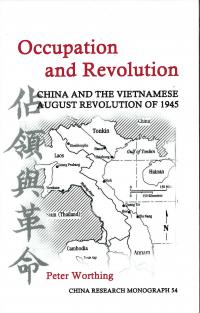Occupation and Revolution
Occupation and Revolution
Peter Worthing
Based on research in archival materials in the People's Republic of China, Taiwan, the United States, and France, this book analyzes the impact of the Chinese occupation on the revolutionary situation in Vietnam in 1945 and 1946. Revising previous accounts that viewed the Chinese occupation as an extension of Chinese "warlord" politics into Vietnam, this study offers new answers to questions about the Chinese involvement in, and contributions to, the Vietnamese August Revolution.
As a nonprofit academic press, we need your support to publish our books. Your gift can help us make more of our titles available as e-books. DONATE NOW
Title information
In August 1945, Chinese Nationalist armed forces marched across the China-Vietnam border in order to accept the surrender of the defeated Japanese army in Indochina north of the sixteenth parallel. Once in Vietnam, Chinese troops confronted a complex situation in which Asian nationalism and European colonialism prepared to clash in Indochina. Based on research in archival materials in the People's Republic of China, Taiwan, the United States and France, this book analyzes the impact of the Chinese occupation on the revolutionary situation in Vietnam in 1945 and 1946. Revising previous accounts which viewed the Chinese occupation as an extension of Chinese "warlord" politics into Vietnam, this study offers new answers to questions about the Chinese involvement in, and contributions to, the Vietnamese August Revolution.
Peter Worthing
Peter Worthing is associate professor of history at Texas Christian University.
B.A. Trinity College, M.A. University of Hawai'i, Manoa, Ph.D. University of Hawai'i, Manoa
Occupation and Revolution
Abbreviations Used in the Notes – vi
Acknowledgments – vii
Introduction – 1
1. The Context of Sino-Vietnamese Relations – 5
2. China, Vietnam, and the Pacific War – 23
3. China and the Vietnamese Nationalists – 40
4. Planning for the Occupation – 54
5. On the Ground in Hanoi – 69
6. The Sino-French Financial Dispute – 89
7. China and the August Revolution – 101
8. Negotiations: January 1946 – 113
9. Negotiations: February 1946 – 128
10. Negotiations: March 1946 – 143
11. The Haiphong Incident – 158
Conclusion – 170
Appendix 1: Sino-French Agreement –174
Appendix 2: Exchange of Notes – 177
Appendix 3: Franco-Vietnamese Preliminary Agreement of 6 March 1946 – 179
Sources Cited – 182
Index – 192
|
JOURNAL REVIEWS |
|
"Occupation and Revolution is a step forward in our understanding of Chinese decision-making about Indochina between September 1945 and March 1946, and it offers students of Nationalist China yet another case study of the delicate dynamics of power that existed between centre and periphery." ~ David G. Marr, Australian National University, in The China Journal (http://www.jstor.org/stable/3182496) |
|
"Worthing's analysis of the crisis leading up to the Franco-Vietnamese agreement of March 6, 1946 is the book's most valuable contribution. Through a detailed account of Chinese decision-making in Hanoi and Chongqing, based both on Chinese and French sources, Worthing throws new light on the triangular Franco-Vietnamese-Chinese relationship." ~Stein Tønnesson, International Peace Research Institute, Oslo, in The Journal of Asian Studies (http://www.jstor.org/stable/3096364) |
|
"Peter Worthing's monograph corrects the standard account of the post-war Chinese occupation of Vietnam north of the 16th parallel. After two brisk introductory chapters on the history of Sino-Vietnamese relations, Worthing engages the main subject of his book, a detailed narrative of Chinese policy at both central and local levels, correcting earlier misperceptions as he goes." ~Marilyn B. Young, New York University, in Pacific Affairs (http://www.jstor.org/stable/4127223) |

